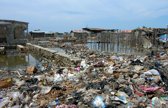

ESchoolToday: Noise Pollution. Sound is essential to our daily lives, but noise is not. Noise is generally used as an unwanted sound, or sound which produces unpleasant effects and discomfort on the ears. Sound becomes unwanted when it either interferes with normal activities such as sleeping, conversation, or disrupts or diminishes one’s quality of life. Not all noise can be called noise pollution. If it does not happen reqularly, it may be termed as 'Nuisance' Scientists also believe that its not only humans who are affected. Generally, noise is produced by household gadgets, big trucks, vehicles and motorbikes on the road, jet planes and helicopters hovering over cites, loud speakers etc. Noise (or sound) is measured in the units of decibels and is denoted by the dB. Noise is considered as environmental pollution, even though it is thought to have less damage on humans than water, air or land pollution.
Let us learn more. ESchoolToday: Air Pollution. What is air pollution? Air pollution (say: po-loo-shun) occurs when gases, dust particles, fumes (or smoke) or odour are introduced into the atmosphere in a way that makes it harmful to humans, animals and plant. This is because the air becomes dirty (contaminated or unclean). The Earth is surrounded by a blanket of air (made up of various gases) called the atmosphere. The atmosphere helps protect the Earth and allow life to exist.
Without it, we would be burned by the intense heat of the sun during the day or frozen by the very low temperatures at night. Any additional gas, particles or odours that are introduced into the air (either by nature or human activity) to distort this natural balance and cause harm to living things can be called air pollution. Things that pollute the air are called pollutants. There are two types of pollutants: Primary pollutants are those gases or particles that are pumped into the air to make it unclean.
Why is air pollution such an important issue today? ESchoolToday: Water Pollution. What is water pollution? Water pollution is the contamination of water bodies (e.g. lakes, rivers, oceans, aquifers and groundwater), very often by human activities. Water pollution occur when pollutants (particles, chemicals or substances that make water contaminated) are discharged directly or indirectly into water bodies without enough treatment to get rid of harmful compounds. Pollutants get into water mainly by human causes or human factors. Water pollution can be a Point-source, Non Point-source, or Transboundary in nature (Click here to learn more).
Water pollution is the second most imperative environmental concern along with air pollution. Any change or modification in the physical, chemical and biological properties of water that will have a detrimental consequence on living things, is water pollution. The water pollution problem Water covers over 70% of the Earth’s surface. Water pollution affects drinking water, rivers, lakes and oceans all over the world. WWF: Pollution. ESchoolToday: Land Pollution. What is land pollution? Land pollution is the deterioration (destruction) of the earth’s land surfaces, often directly or indirectly as a result of man’s activities and their misuse of land resources. It occurs when waste is not disposed off properly, or can occur when humans throw chemicals unto the soil in the form of pesticides, insecticides and fertilizers during agricultural practices. Exploitation of minerals (mining activities) has also contributed to the destruction of the earth’s surface.
Since the Industrial Revolution, natural habitats have been destroyed, and environments have been polluted, causing diseases in both humans and many other species of animals. Human actions have also caused many large areas of land to lose or reduce their capacity to support life forms and ecosystems.